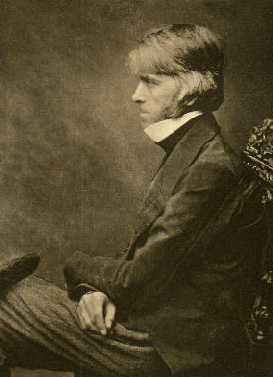Thomas Carlyle (Thomas Carlyle)

Scottish Philosopher, Satirist, Author, and Historian. He was born at Ecclefechan, in Dumfries, Scotland, to Calvinist parents. He attended school at the Annan Academy in Annan, Dumfries, Scotland, but left after three years due to constant bullying by his classmates. In 1809 he graduated from the University of Edinburgh, Edinburgh, Scotland, and became a mathematics teacher in Annan and then in Kirkcaldy, Fife, Scotland. In 1819 he returned to the University of Edinburgh, where he suffered from an intense crisis of faith and a painful stomach ailment, which remained with him throughout the rest of his life. Growing up, he had aspirations of pursuing a career as a minister but in 1821 he abandoned it to focus instead on becoming a writer. He developed a deep interest in German Idealism literature, especially the work of Johann Gottlieb Fichte and established himself as an expert in a series of essays for Frasier’s Magazine, and through the translation the works of German writers, most notably Johann Wolfgang von Goethe. In 1826 he married writer Jane Baillie Welsh and they resided at the home she had inherited at Craigenputtock, in Dumfries, where he wrote some of his most distinguished essays and began a lifelong friendship with American essayist Ralph Waldo Emerson. His first major work, “Sartor Resartus” (“The Tailor Retailored”) was started in 1831 and when it was published, it received little success initially but gained in popularity over the next few years. In 1834 he moved to Chelsea in London, England, and became known as the “Sage of Chelsea.” In 1837 he wrote “The French Revolution: A History” (3 volumes) that focused on the historical oppression of the poor, and it became very successful. English writer Charles Dickens would use it as a main source for the events of the French Revolution in his novel “A Tale of Two Cities.” In 1841 he wrote “On Heroes and Hero Worship and the Heroic in History,” based on his belief in the importance of heroic leadership. In his “Letters and Speeches of Oliver Cromwell” (1845, 3 volumes), he presented a positive image of Cromwell, even though he was instrumental in the overthrow and execution of the English King Charles I. His last major writing was the epic life of the Prussian King Frederick the Great that he compiled from 1852 to 1865, in which he tried to show how a heroic figure can forge a state and help to create a new moral culture for a nation. The work consisted of six volumes, with the first two volumes published in 1858, the third in 1862, the fourth in 1864, and the final two in 1865. He referred to the completed work as his “Thirteen Years War,” which involved his visiting Germany to study the scenes of Frederick’s battlefields. The public’s reception to the work was mixed and its effort took a toll on his life and he became increasingly depressed and subject to various (probably psychosomatic) ailments. In 1866 his wife, who had been an invalid for some time unexpectedly died, driving him into deep despair and he partly retired from active society. He was appointed rector of the University of Edinburgh and published his last major works, “Shooting Niagara: and After?” (1867), “The Early Kings of Norway” (1875), and “Reminiscences of My Irish Journey in 1849” (posthumously, 1882). Upon his death, it was made possible for his remains to be interred at Westminster Abbey, but his wishes to be buried next to his parents at Ecclefechan were honored. (bio by: William Bjornstad) Family links: Parents: James Carlyle (1758 – 1832) Margaret Aitken Carlyle (1771 – 1853) Spouse: Jean Baillie Welsh Carlyle (1801 – 1866) Siblings: John M Carlisle (____ – 1872)* Thomas Carlyle (1795 – 1881) Janet Carlyle (1799 – 1801)* *Calculated relationship
Born
- December, 04, 1795
- Scotland
Died
- February, 02, 1881
- England
Cemetery
- Ecclefechan Churchyard
- Scotland

